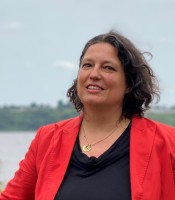Lessons learned from Cape Town's response to a record-breaking drought
Prof. Gina Ziervogel
Read the book
Day Zero: one city and a record breaking drought
The best way to learn is from experience, and not just one’s own. In the face of Climate change, one city’s struggle and response to an environmental shock contributes invaluable insight into the global environmental and climatic challenges ahead.
In the spring of 2018, the world was stunned to hear that Cape Town, a city of 4 million people, was about to run out of municipal water. A record-breaking three-year drought, which even seasoned climatologists hadn’t seen coming, had brought the city to the verge of emergency water rationing. Local officials even coined a name for the day they would have to enforce such measures, they called it ‘Day Zero’.
That day was narrowly avoided this time around. But what about tomorrow? Considering Climate change’s impact on the frequency of such extreme events, associated with the rapid rates of urbanization globally, the next such crisis is not a matter of if, but when.
Drawing lessons from Cape Town ‘Day Zero’ Water Crisis
One year later, a group of social researchers from the University of Cape Town has put together a book to reflect on the lessons learned from the drama of this drought. Day Zero documents the stories of the different ways in which Cape Town’s City and residents responded. It captures the perspectives and experiences of the various actors involved, in a way that will help us understand the complex processes at work in the administration and the immense challenges Climate change adaptation holds. In particular, the book gives concrete examples of the various actions that were undertaken, aiming to inform relevant actors from all over the world of the strategies that did (or did not) lead to conclusive results.
Overall, the hindsight the book provides on Cape Town’s experience shows that water does not solely depend on infrastructure. Instead, it suggests that water should be seen as a governance issue, as well as an economic and a social one. Notably, it puts forward the benefit of extending the responsibility of such a crisis to the entire city management, rather than to confine it to the expertise of one specialized department alone.
Associate professor Gina Ziervogel is one of the authors. AXA Research Fund grantee at the University of Cape Town, Ziervogel works in the field of urban adaptation to climate change. During the drought, she was on the Water Resilience Advisory Committee (WRAC), a committee set up by the municipality to provide expert support. Her intimate involvement made possible the book’s intimate insight into how the City responded to the ‘Day Zero’ Water Crisis.
Day Zero - One city's response to a record-breaking drought
Prof. Gina Ziervogel
Discover professor Gina Ziervogel’s project: towards a more just and more equitable urban resilience
PROJECT PAGE
What Cape Town's drought can teach other cities about climate adaptation
Article by The Conversation
READ THE ARTICLE
Discover research projects related to the topic
Sustainable Living & City
Climate Change
Climate Adaptation & Resilience
Urban Planning
Resilient Infrastructure & Safety
Environmental Justice
Post-Doctoral Fellowship
Australia
2023.06.20
Indicators for Climate Resilient City Planning
Expected start date:June-2023 Cities contribute enormously to global greenhouse emissions and are key drivers of climate change. By the same... Read more

Melanie
LOWE

